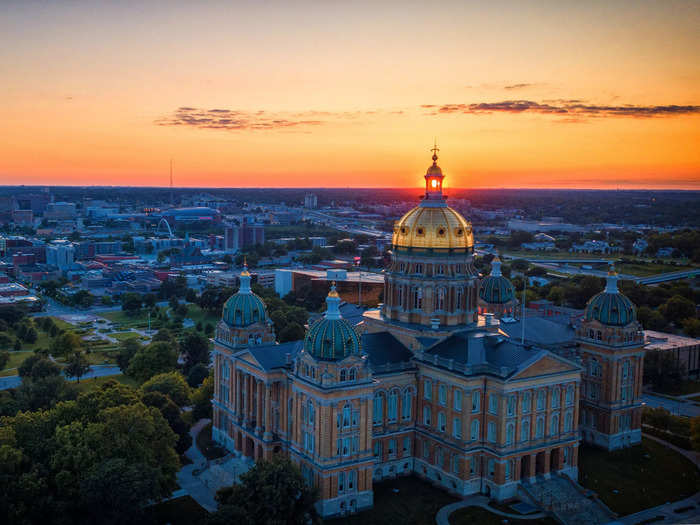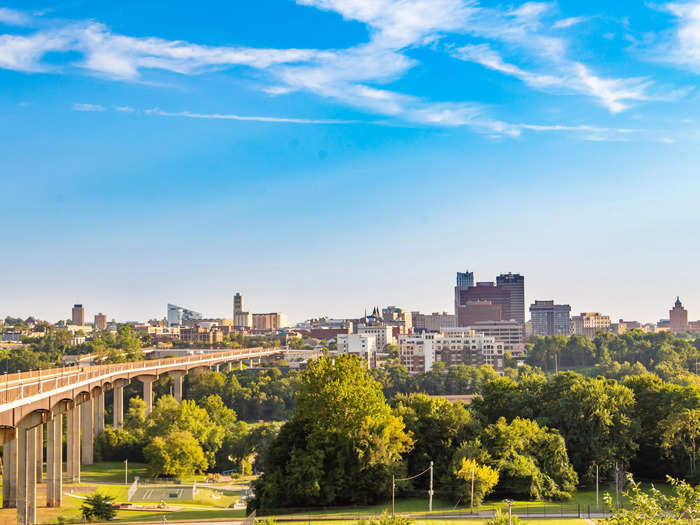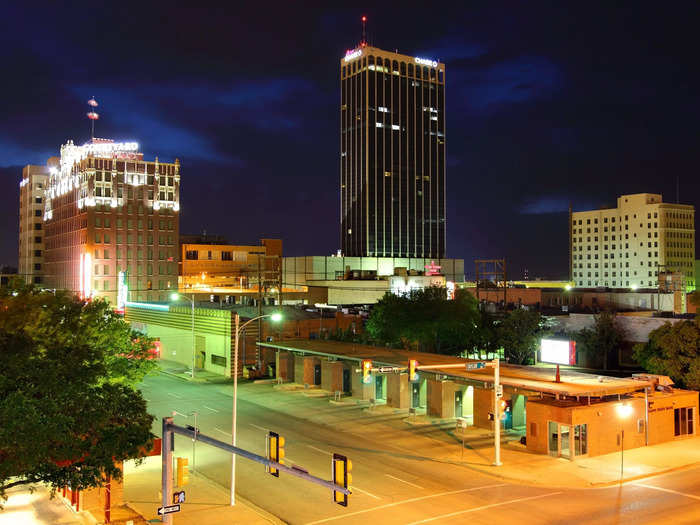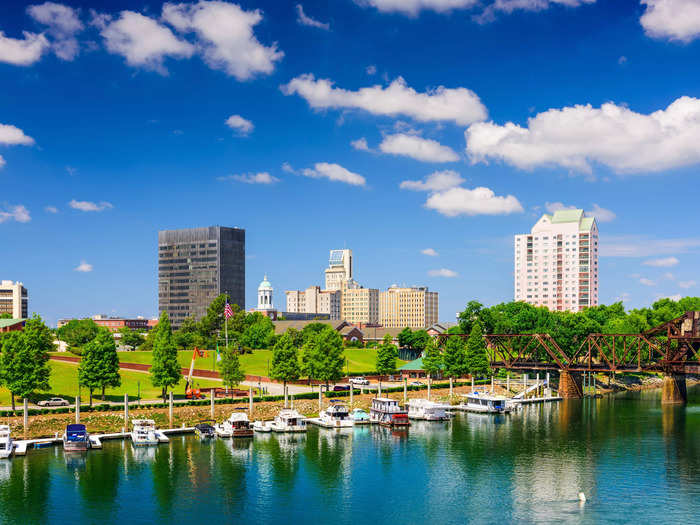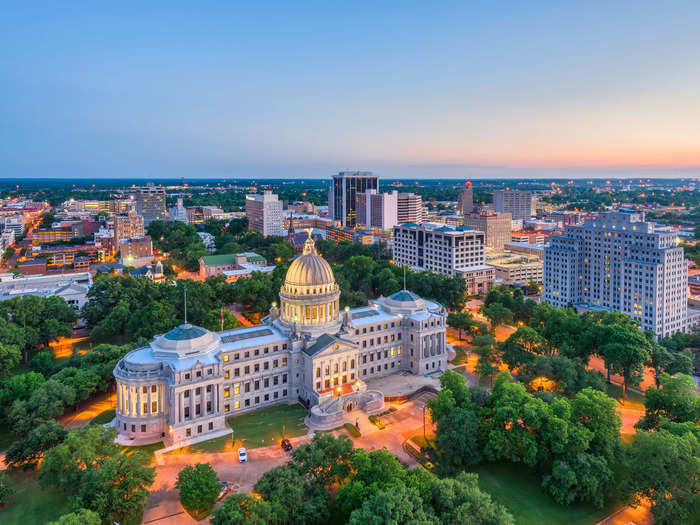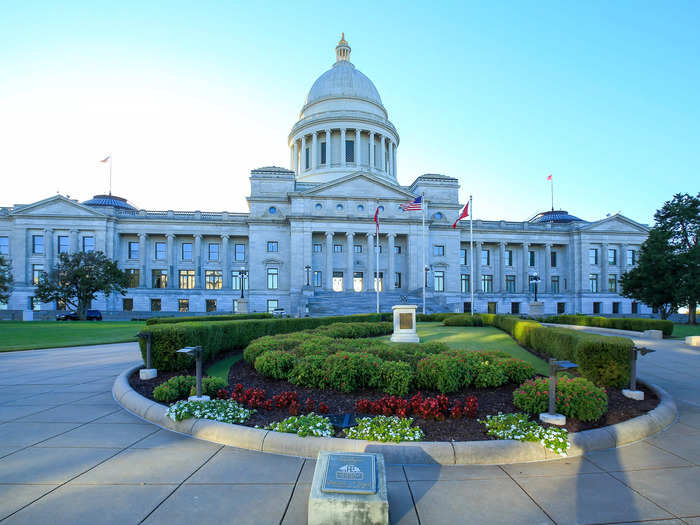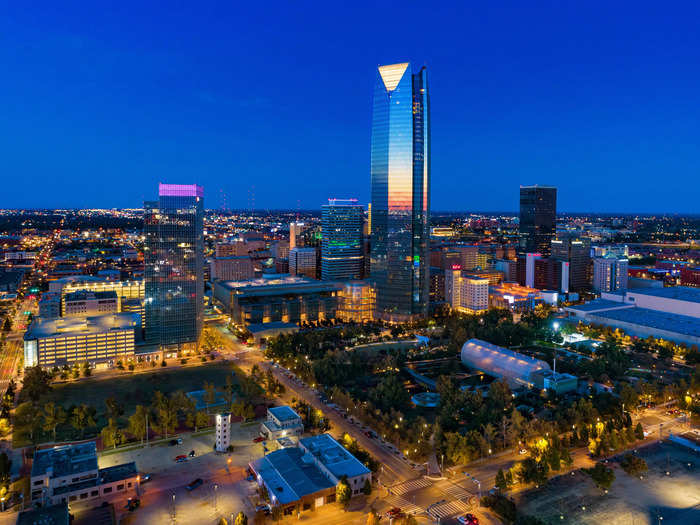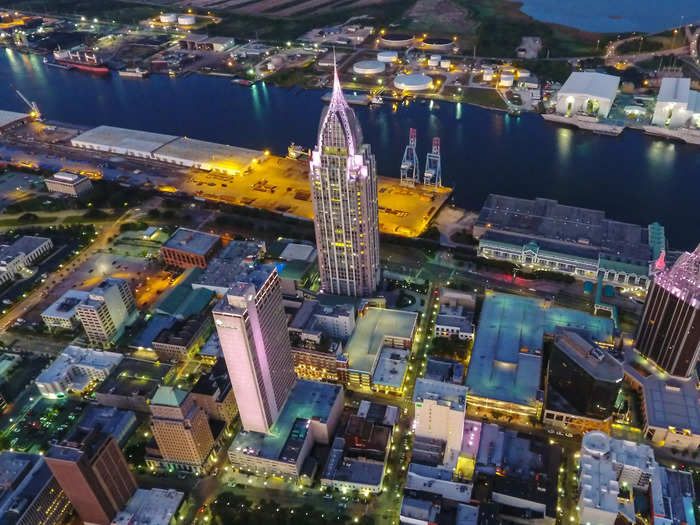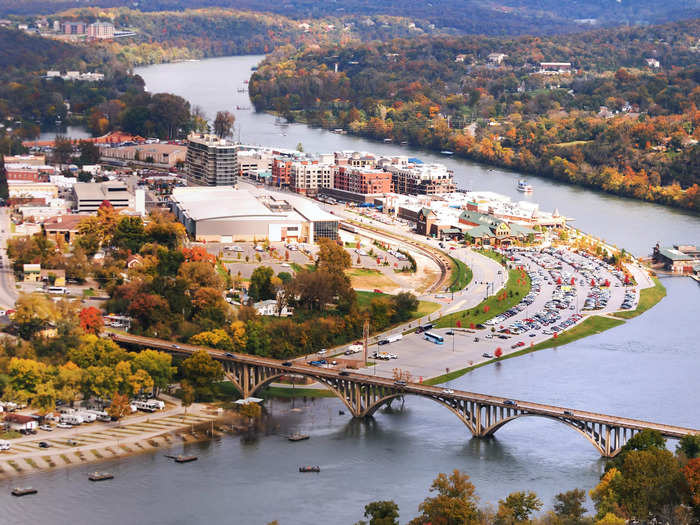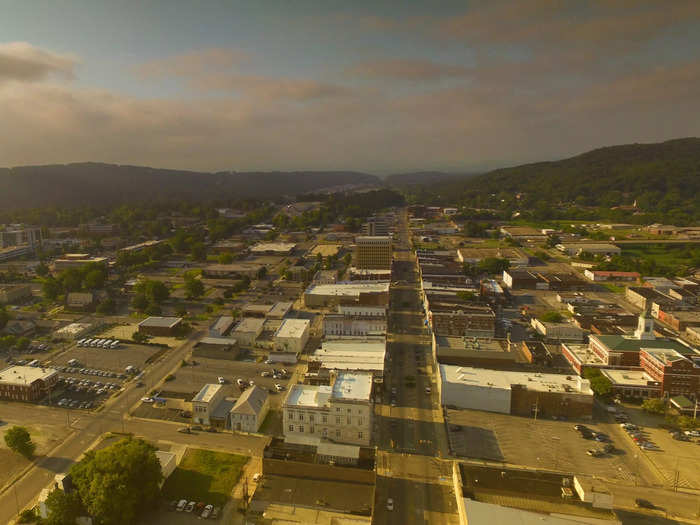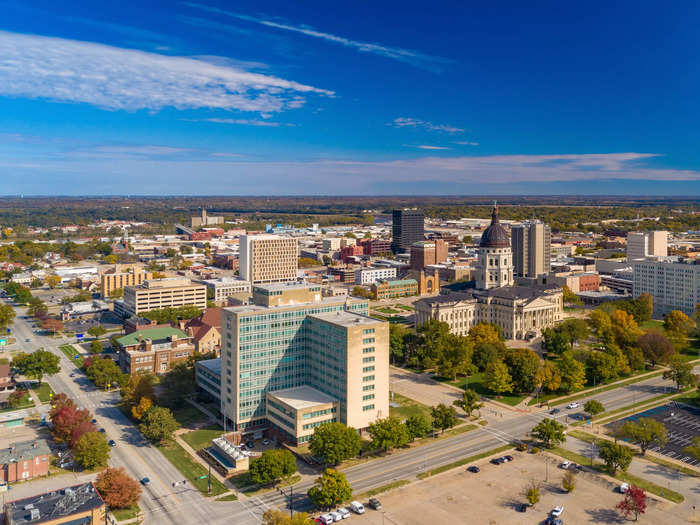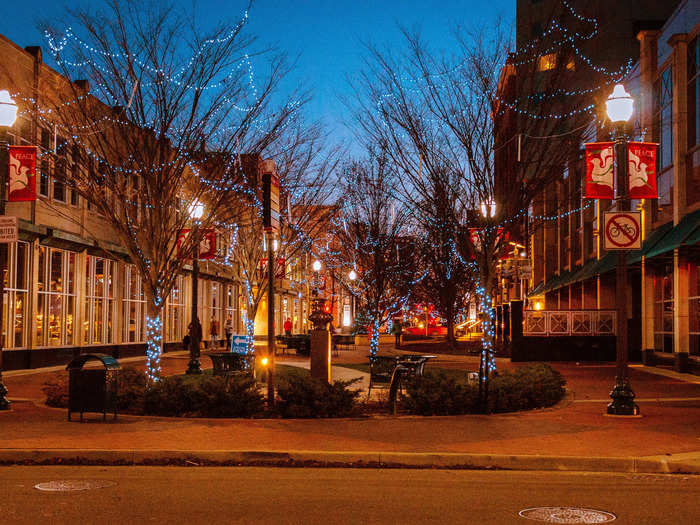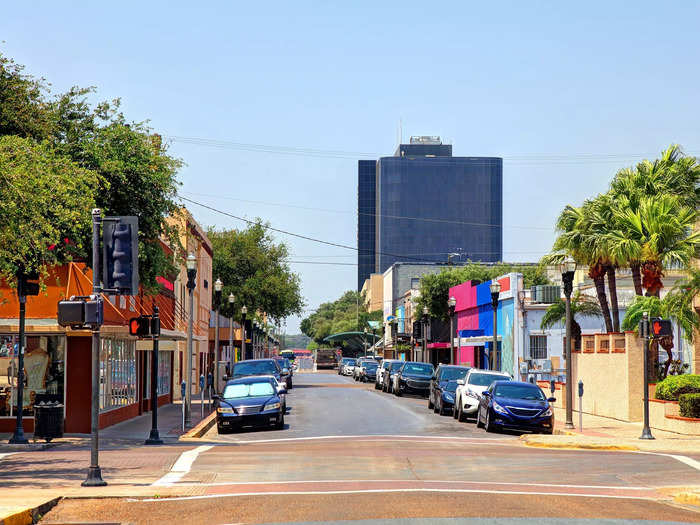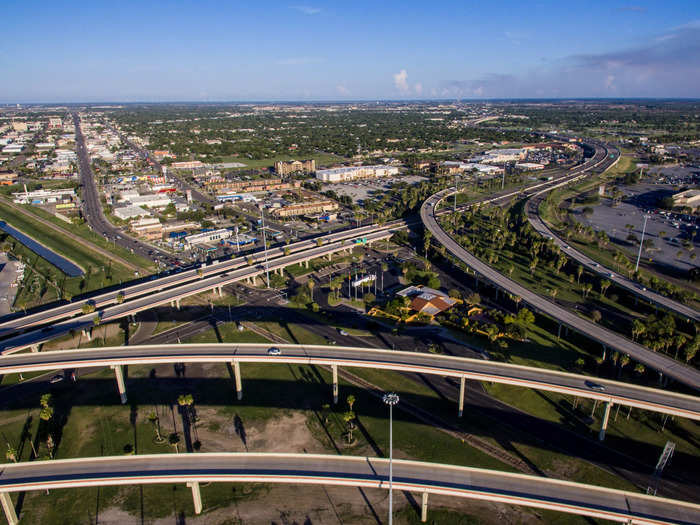A night time view of downtown Oklahoma City.Getty Images.
- Inflation has significantly increased the cost of living for American households.
- Pricey housing, groceries, and essentials prompt people to consider moves to more affordable places.
The cost of living in the US skyrocketed in 2022 as surging inflation drove up prices for everything from gas to food to home prices.
Higher costs have encouraged many Americans to reconsider the way they live — and, crucially, where they live. An October report from real-estate brokerage Redfin suggests that higher mortgage rates and mounting economic woes are making expensive parts of the country "less attractive" to prospective buyers.
"Six percent mortgage rates are exacerbating already-high home prices and motivating home buyers — especially remote workers — to leave expensive areas for more affordable ones," Taylor Marr, deputy chief economist at Redfin, said in the report. "Persistent inflation and slumping stocks are also cutting into buyers' budgets, making relatively affordable areas even more attractive."
While things might not be as expensive next year, even President Joe Biden said earlier this month that it's "going to take time to get inflation back to normal levels." Moving for a lower cost of living, then, is a trend likely to carry over into 2023 as respected economists and executives brace for a recession.
But where should you move? Personal-finance company Kiplinger identified America's cheapest cities by calculating the living expenses — including prices for housing, groceries, transportation, healthcare, and miscellaneous goods and services — of 267 urban areas in the US that have a population of at least 50,000.
According to their methodology, America's cheapest city is Harlingen, Texas, a small city of less than 72,000 people at the southern tip of Texas near the Mexican border.
Harlingen — which sits in the Rio Grande Valley beside sister city Brownsville and a stretch of sand full of beach resorts called South Padre Island — is also known for its Air Force base and a launch facility for Elon Musk's rocket company, SpaceX.
"The Rio Grande Valley in general is very affordable," Craig Grove, a broker and owner of the Brownsville brokerage GRT Realty, told Insider. "We've experienced a lot of job growth in the last couple of years because of SpaceX, and there's a new medical school."
Grove confirmed that the lower cost of living around Harlingen is attractive.
"People have been saying, 'I don't want to be in these big cities,'" he added. "It's gotten too unaffordable, so they moved to the Valley and that's made Harlingen more attractive. It is very old school in a nice way — people are very friendly, it still feels like a small town and the houses are affordable."
The other affordable cities on Kiplinger's list are largely in the South and the Midwest. Read on to see them all — and see if any might be right for you in 2023.
15. Des Moines, Iowa
Des Moines, Iowa. Getty Images
Cost of living: 15.3% below US average
Metro population: 719,146
Median household income: $74,208
Median home value: $229,900
Unemployment rate: 2.4%
14. Akron, Ohio
Akron, Ohio. Getty Images
Cost of living: 15.6% below US average
Metro population: 700,015
Median household income: $63,367
Median home value: $181,700
Unemployment rate: 4.0%
13. Amarillo, Texas
Amarillo, Texas. Getty Images
Cost of living: 15.6% below US average
Metro population: 270,119
Median household income: $58,354
Median home value: $167,000
Unemployment rate: 2.8%
12. Augusta-Aiken, Georgia/South Carolina
Augusta, Georgia. Getty Images
Cost of living: 16.4% below US average
Metro population: 616,395
Median household income: $56,515
Median home value: $182,000
Unemployment rate: 3.6%
11. Jackson, Mississippi
Jackson, Mississippi. Getty Images
Cost of living: 16.6% below US average
Metro population: 586,758
Median household income: $54,123
Median home value: $178,100
Unemployment rate: 3.1%
10. Conway, Arkansas
The Capitol building in Little Rock, Arkansas. Getty Images
Cost of living: 16.7% below US average
City population: 65,126
Median household income: $53,029
Median home value: $230,900
Unemployment rate: 2.5%
9. Oklahoma City, Oklahoma
Oklahoma City. Getty Images.
Cost of living: 16.8% below US average
Metro population: 1,441,647
Median household income: $61,815
Median home value: $190,800
Unemployment rate: 3.3%
8. Mobile, Alabama
Mobile, Alabama. Getty Images.
Cost of living: 17.2% below US average
Metro population: 430,714
Median household income: $49,691
Median home value: $159,100
Unemployment rate: 3.5%
7. Joplin, Missouri
Joplin, Missouri. Getty Images.
Cost of living: 17.5% below US average
Metro population: 182,541
Median household income: $55,045
Median home value: $149,500
Unemployment rate: 2.3%
6. Anniston, Alabama
Anniston, Alabama. Getty Images
Cost of living: 17.6% below US average
Metro population: 115,972
Median household income: $46,524
Median home value: $139,400
Unemployment rate: 4.4%
5. Topeka, Kansas
Topeka, Kansas. Getty Images
Cost of living:19.4% below US average
Metro population: 232,670
Median household income: $57,474
Median home value: $154,800
Unemployment rate: 2.7%
4. Kalamazoo, Michigan
Kalamazoo, Michigan. Getty Images
Cost of living: 20.7% below US average
Metro population: 261,108
Median household income: $62,128
Median home value: $208,300
Unemployment rate: 4.5%
3. McAllen, Texas
McAllen, Texas. Getty Images
Cost of living: 21.8% below US average
Metro population: 880,356
Median household income: $44,818
Median home value: $107,500
Unemployment rate: 4.3%
2. Decatur, Illinois
Decatur, Illinois. Getty Images
Cost of living: 22% below US average
Metro population: 102,432
Median household income: $46,807
Median home value: $110,800
Unemployment rate: 5.7%
1. Harlingen, Texas
Harlingen, Texas. Getty Images
Cost of living: 24.4% below US average
Metro population: 423,029
Median household income: $48,115
Median home value: $103,500
Unemployment rate: 5.4%

